Crisis in Belgium: Trembling Thrones in Brussels
From the desk of Paul Belien on Tue, 2007-09-18 08:44
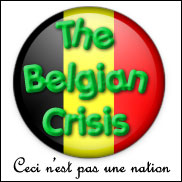
Today is the 100th day since the Belgian general elections of 10 June. The Belgian politicians are still unable to form a government. Today is also the 20th day of the appointment of Herman Van Rompuy as “royal scout” by Belgium’s King Albert II. The latter asked Mr Van Rompuy, a veteran politician who is a former Deputy Prime Minister and former leader of the Flemish Christian-Democrats, to defuse the situation. So far his efforts have come to nothing.
Belgium is a country with 10.5 million inhabitants, of whom 6 million live in Dutch-speaking Flanders, 3 million in French-speaking Wallonia and 1 million in the officially bilingual, but predominantly French-speaking, capital Brussels, which is an enclave within Flanders.
Free-market oriented Flanders, though 60% of the population, generates 70% of the country’s gross domestic product (GDP) and is squeezed to subsidize socialist Wallonia. Belgium’s Constitution stipulates that no major decisions can be taken without a majority in both parts of the country and that the government should consist of 50% Flemings and 50% Walloons. In practice this means that 20% of the population (i.e. half of the Walloons) can veto every decision. This has made the Parti Socialiste (PS), the dominant party in Wallonia, the power broker in the country.
In 2005, I published my book “A Throne in Brussels: Britain, the Saxe-Coburgs and the Belgianisation of Europe,” which is the only English-language history of Belgium for the general public. The book predicts that Belgium will “fall apart in the next ten years.” Barely two years later the last episode of Belgium’s history seems to have begun. “A praline divorce is in order,” the Economist headlined on 6 Sept. 2007. “Even in a Europe riven by secessionist movements, Belgium takes the prize for the most fissiparous country of them all,” the New York Sun wrote on 11 Sept. 2007.
The second edition of my book will be printed this week. International journalists who would like a review copy can request one from the publisher [Imprint Academic in Exeter (UK) and Charlottesville, VA (US)] here.
The world awoke to Belgium’s instability after the general elections of 10 June 2007. In Flanders, Belgium’s Dutch-speaking northern half, these were won by two parties: CD&V (Christen-Democratisch & Vlaams), an alliance of Christian-Democrats and Flemish-Nationalists which aims to transform Belgium into a confederacy of Flanders and Wallonia, the country’s French-speaking southern half, and the Flemish-secessionists, who aim for downright Flemish independence. Together they polled 56.1% of the Flemish electorate. CD&V leader, Yves Leterme, the son of a Walloon father and a Flemish mother, became the most popular politician in Flanders, with more than 800,000 votes to his name.
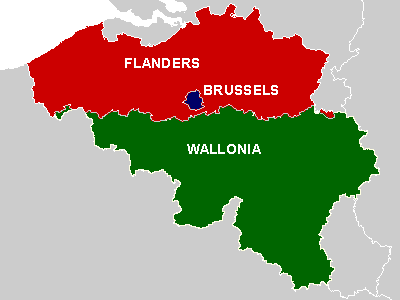
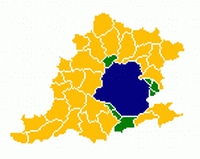 The huge gains of Flemish confederalists and secessionists resulted from the deep frustration with the political stalemate concerning the electoral constituency of Brussels-Halle-Vilvoorde (BHV). In a 2003 ruling the Belgian Constitutional Court ordered the Belgian government to abolish this constituency, which allows French-speaking politicians to stand for election in Flanders, while Dutch-speaking politicians are not allowed to stand for election in Wallonia. The Constitutional Court ruled that this is a discrimination of the Flemings and exhorted the government to rectify the situation by July 2007 at the latest, either by allowing Flemings to stand for election in Wallonia, or by no longer allowing Walloons to stand in Flanders.
The huge gains of Flemish confederalists and secessionists resulted from the deep frustration with the political stalemate concerning the electoral constituency of Brussels-Halle-Vilvoorde (BHV). In a 2003 ruling the Belgian Constitutional Court ordered the Belgian government to abolish this constituency, which allows French-speaking politicians to stand for election in Flanders, while Dutch-speaking politicians are not allowed to stand for election in Wallonia. The Constitutional Court ruled that this is a discrimination of the Flemings and exhorted the government to rectify the situation by July 2007 at the latest, either by allowing Flemings to stand for election in Wallonia, or by no longer allowing Walloons to stand in Flanders.
Belgium’s Liberal-Socialist government coalition led by Prime Minister Guy Verhofstadt was unable to set things straight. The Walloon ministers vetoed any change in the existing situation. The result was a severe battering of the Liberal and the Socialist parties in Flanders in the 10 June elections.
After the elections, the inability of Belgium’s politicians to form a government has led to Belgium’s deepest political crisis ever. Flemish politicians who agree to join a government which does not abolish BHV know that they are committing political suicide in view of the next regional elections in 2009, whilst Walloon politicians fear the same will happen to them if they agree to abolish BHV. Meanwhile, as long as no solution is found, new general elections at the national (federal) level will be unconstitutional. Technically this situation can continue until 2011 when new general elections are due, but the general impression is that a country cannot function for four years without a government. Hence, King Albert II, the descendant of a German prince from Saxe-Coburg whom London installed in Brussels in 1831 because he was neither Fleming nor Walloon, sees the foundation under his throne crumble. Albert’s popularity in Flanders has dropped to the lowest level ever.
In an interview in the French newspaper Libération of 10 Sept. 2007, Joëlle Milquet, the leader of Belgium’s Humanist Democratic Party and one of the Walloon hardliners (the Flemings call her ‘Madame Non’), said that Belgium only has a future
“if people are still willing to believe in it and if they have a minimum understanding of the common interest, which is the case for the French-speakers and, I believe, a large part of the Dutch-speakers. The future of democracies belongs to federalism, because this model enables one to bring together persons of different languages, cultures and traditions in a common project. From this point of view, Belgium is a laboratory. If, with 10 million people in a developed country one cannot succeed in building a collective project, this marks the failure of what one is attempting to construct at the European and even the international level.”
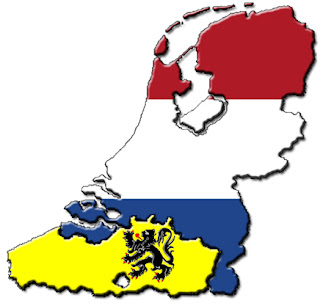 What next? A breakup into two independent states might be achievable, or Flanders might join the Netherlands and Wallonia fall apart with one piece going to France and another to Luxemburg. Brussels could join Flanders, be shared between two countries or become an independent city state, perhaps the last remnant of the Saxe-Coburg kingdom. In the latter case it would also become the first state in Western Europe with a Muslim majority.
What next? A breakup into two independent states might be achievable, or Flanders might join the Netherlands and Wallonia fall apart with one piece going to France and another to Luxemburg. Brussels could join Flanders, be shared between two countries or become an independent city state, perhaps the last remnant of the Saxe-Coburg kingdom. In the latter case it would also become the first state in Western Europe with a Muslim majority.
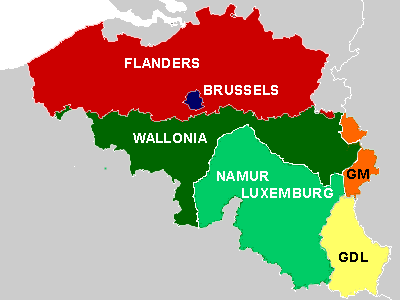
No matter what happens, however, a Belgian divorce will leave the European Union with a headache. The thrones of the Brussels Eurocrats are trembling, too, because Belgium, the EU’s host country, is also the EU prototype. If the Flemings and the Walloons are unable to live together in their federal Kingdom, how can anyone expect the European Union, with its 27 member states, to develop into one federal European state? As The Independent wrote on 11 Sept. 2007 “It is a great irony – beloved of Europhobes – that Belgium, one of the greatest advocates of a federal Europe, cannot make sense of its own federal system.” What an irony indeed. It indicates that the ‘Europhile’ dream of Europe as a single state is doomed from the start.
Last week, Walloon politicians suggested that a compromise can be reached if the Flemish Christian-Democrats drop Mr Leterme as their candidate for the function of Prime Minister and put forward “royal scout” Van Rompuy instead. The latter is more acceptable to the Walloons because he is a federalist rather than a confederalist. Another Walloon suggestion is to have Louis Michel, the Belgian EU Commissioner for Development and Humanitarian Aid, to become the country’s next Prime Minister. Mr. Michel, an outspoken admirer of Fidel Castro, squandered Belgium’s international reputation during his spell as Belgian Foreign Minister from to 1999 to 2004, but he is one of the few Walloons who speaks Dutch flawlessly.
In Belgium it is the King who asks a politician to become “formateur” (Prime Minister Designate) and put together a government which he will lead as the next Prime Minister. The King called in Mr. Van Rompuy to be his “scout” after Mr Leterme’s failed in his task as formateur because the Walloon parties turned down his proposals.
According to the Flemish press prominent (though anonymous) Christian-Democrats have said that, if the King asks Mr. Van Rompuy to become formateur, he might lose his throne. An attempt to neutralize the very popular Mr. Leterme might result in the Christian-Democrat Party turning republican rather than royalist.
Meanwhile, yesterday, a court in Dendermonde, a Flemish town to the west of Brussels, acquitted three people who had boycotted last June’s elections, an illegal act as voting is compulsory in Belgium. The three argued that last June’s elections were already unconstitutional because the BHV constituency discriminates Flemings and discrimination is not allowed by the Constitution. The judge acquitted the three, two men and one woman, with the argument that, although it was not up to him to decide whether or not the elections were unconstitutional, prominent legal and constitutional experts as well as leading politicians think that they were, indeed, unconstitutional.
On the current crisis in Belgium, see also:
McKinsey CEO Calls for End of Belgium, Resigns, 13 December 2005
King Warns for Dissolution of Belgium, 1 February 2006
Flanders and France Vote for the Right. But Flanders Will Not Get What It Is Entitled To, 11 June 2007
The Influence of the Immigrant Vote on Belgian Politics, 26 June 2007
EU: The Model is Collapsing. Brussels Calls upon King for Help, 18 August 2007
After Belgium: Will Flanders and the Netherlands Reunite? 23 August 2007
King Summons Unelected Councillors to Solve Crisis. Will France Annex Wallonia? 28 August 2007
Royal Scout Keeps a Low Profile, Brussels Recalls Ambassador in Paris, 31 August 2007
Could Sarkozy Solve Belgium’s Crisis? 3 September 2007
Even Flemish Muslims Want to Separate from the Walloons, 6 September 2007
Crisis in Belgium: If Flanders Secedes Wallonia Disintegrates, 9 September 2007
After Belgium: Europe’s New Map, 13 September 2007
Background articles explaining Belgium:
A City Without Water Is A City Without A Soul, 28 June 2005
How Flanders Helped Shape Freedom in America, 11 July 2005
The Dark Roots of the EU, 5 December 2005
Nations Under Construction: Defining Artificial States, 13 June 2006
Why Is the Vlaams Belang So Popular? 13 February 2007
Belgium, the EU’s Destiny. The End of Nothingness, 25 August 2007
Why Belgium Is an Artificial State. And the United Kingdom, Switzerland (and Even Austria-Hungary) Are Not, 27 August 2007
| A Throne in Brussels Author: Paul Belien ASIN: 184540033X |

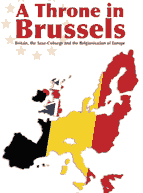
Even on Al-Beeb
Submitted by Amsterdamsky on Tue, 2007-09-18 13:51.
The BBC radio even did a story on this today. They predicted nothing would happen. They even found a Walloon who spoke broken english to interview.
@Schaveiger
Submitted by Leo Norekens on Tue, 2007-09-18 12:46.
Thanks Traveller.
The answer was also in Paul Belien's last paragraph. ("The three argued...."). That part was 100% accurate.
@ Leo Norekens
Submitted by Schaveiger on Tue, 2007-09-18 14:25.
Sorry Leo and Traveller, I overlooked this.
@ Leo Norekens
Submitted by Schaveiger on Tue, 2007-09-18 12:21.
What excuse did they invoke to refuse assistance in the polling station ?.
@ Schaveiger
Submitted by traveller on Tue, 2007-09-18 12:26.
That the elections were unconstitutional, which was the opinion of most political analysts.
"Meanwhile, yesterday, a
Submitted by Leo Norekens on Tue, 2007-09-18 10:59.
"Meanwhile, yesterday, a court in Dendermonde, a Flemish town to the west of Brussels, acquitted three people who had boycotted last June’s elections, an illegal act as voting is compulsory in Belgium."
You are suggesting here that the three had refused to vote, which is not the case. In fact they had refused to fulfil their duties as assistant officers of a polling station.